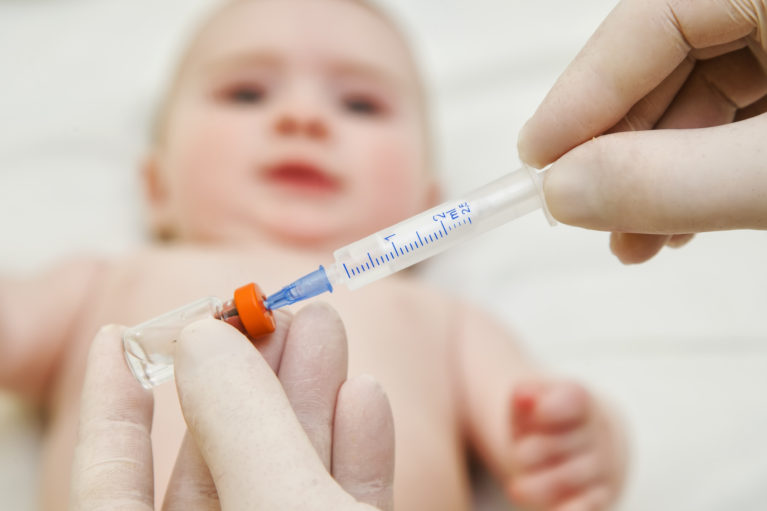Vaccinations immunize humans against harmful infectious diseases such as polio, diphtheria, and measles. The terms “vaccination” and “immunization” essentially mean the same thing. Being vaccinated or immunized indicates you have been given a substance containing killed or weakened versions of pathogens that cause a particular disease. These elements and other microorganisms contained in a vaccine that stimulate your immune system are known as “antigens”.
Infectious diseases are spread by viruses or bacteria highly resistant to infection preventatives like clean water, sanitation, and good hygiene practices. Immunizations are necessary to prevent certain diseases from infecting people on a global scale. In addition, vaccinations help stop the re-development of eradicated or rarely seen diseases such as polio or whooping cough.
Is It Safe to Get Your Infant Immunized?
According to the World Health Organization licensed vaccines approved by the FDA are vigorously tested and must pass through numerous trial stages before they are placed on the market. Scientists continue monitoring information reported about vaccinations from physicians to ensure any adverse event is thoroughly and promptly investigated. The WHO also states that you are much more likely to suffer life-threatening complications by vaccine-preventable diseases than by vaccines themselves. For example, If you contract polio, you can become paralyzed or severely crippled. Complications from the measles include blindness (due to high fever) and encephalitis (infection of the spinal cord and brain).
The probability that an infant develops serious complications following immunization is extremely rare; only one or two cases out of over a million vaccinations given to children have reported reactions requiring emergency medical treatment. In most cases, complications arose due to an unknown pre-existing condition affecting the child at the time of the vaccination.
Infant Immunization Schedule (0-15 Months)
The Centers for Disease Control (CDC) recommends the following infant immunization schedule be followed to prevent babies from contracting a serious infectious disease:
At birth:
- First dose of hepatitis B
Between one and two months old:
- Second dose of hepatitis B
- First dose of rotavirus
- First dose of diphtheria/tetanus/pertussis
- First dose of Haemophilus influenzae (Hib) type b,
- First dose of pneumococcal conjugate
- First dose of polio vaccine
At four months old:
- Second dose of rotavirus
- Second dose of DTaP
- Second dose of HiB
- Second dose of pneumococcal conjugate
- Second dose of polio.
At six months old:
- Third dose of DTaP
Between six and 15 months:
- Third dose of pneumococcal conjugate
- Third dose of polio.
- The CDC also recommends infants between six and 15 months begin receiving the influenza (IIV) vaccination annually
At 12 months:
- Third dose of HiB
Between 12 and 15 months:
- First dose of measles, mumps, rubella (MMR)
- First dose of Varicella (chicken pox) vaccination
At 15 months:
- Fourth dose of DTaP
- Fourth dose of Hib
Why Do Infants Need Multiple Vaccinations for the Same Disease?
At birth, infants are immediately exposed to millions of pathogens in the environment. Fortunately, their immune systems are naturally ready to respond effectively to environmental and vaccine antigens. Scientists haven’t discovered why acquired immunity differs among different vaccines. However, most immunizations require boosters to maintain your immunity. Doctors tell concerned parents that booster shots are a way of “reminding” a child’s immune system that a particular disease is still prevalent and poses a risk to the child’s health.
What Happens If a Parent Thinks a Vaccination has Harmed Their Child?
Funded solely by manufacturers of vaccines and administered by the DHHS (Department of Health and Human Services), the National Vaccine Injury Compensation Program exists to provide compensation to individuals who win claims against vaccine manufacturers. You can bring cases to the NVICP (National Vaccine Injury Compensation Program) if injuries fall into one of two categories: improper preparation of the vaccine or failure of the company to provide accurate information (whether verbally or on warning labels) about possible side effects of taking the vaccine.
In addition to hiring a professional vaccine injury attorney, you will also need a medical expert witness to testify during court proceedings about the validity of your claim. Medical expert witnesses are essential for giving you a real opportunity to win a vaccine injury case by reviewing medical documents provided by physicians and testifying to the science-based efficacy of these documents.
If you are filing a medical malpractice claim due to a child suffering serious side effects from a vaccination, contact Dr. Mallory today to schedule a consultation appointment.




























